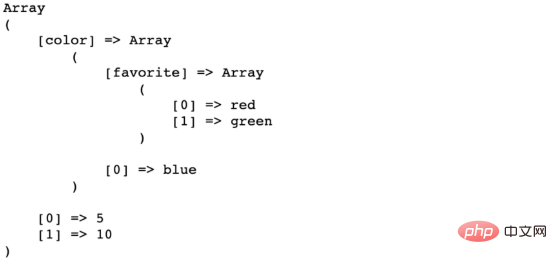
Recursively replace elements of the first array using the passed array array_replace_recursive
$base = array('citrus' => array( "orange") , 'berries' => array("blackberry", "raspberry"), );
$replacements = array('citrus' => array('pineapple'), 'berries' => array('blueberry'));
$basket = array_replace_recursive($base, $replacements);
With index check Calculate the intersection of arrays and use the callback function to compare the indicesarray_intersect_uassoc
$array1 = array("a" => "green", "b" => "brown", "c" => "blue", "red");
$array2 = array("a" => "GREEN", "B" => "brown", "yellow", "red");
print_r(array_intersect_uassoc($array1, $array2, "strcasecmp"));
Recursively merge one or more arrays array_merge_recursive
$ar1 = array("color" => array("favorite" => "red"), 5);\
$ar2 = array(10, "color" => array("favorite" => "green", "blue"));\
$result = array_merge_recursive($ar1, $ar2);
Recursively replace the elements of the first array using the passed arrayarray_replace_recursive
$base = array('citrus' => array( "orange") , 'berries' => array("blackberry", "raspberry"), );
$replacements = array('citrus' => array('pineapple'), 'berries' => array('blueberry'));
$basket = array_replace_recursive($base, $replacements);
print_r($basket);\Convert a linear array to a tree, or multidimensional array
function array_stack (&$a, $p = '@parent', $c = '@children')
{
$l = $t = array();
foreach ($a AS $key => $val):
if (!$val[$p]) $t[$key] =& $l[$key];
else $l[$val[$p]][$c][$key] =& $l[$key];
$l[$key] = (array)$l[$key] + $val;
endforeach;
return $a = array('tree' => $t, 'leaf' => $l);
}
$node = array();
$node[1] = array('@parent' => 0, 'title' => 'I am node 1.');
$node[2] = array('@parent' => 1, 'title' => 'I am node 2.');
$node[3] = array('@parent' => 2, 'title' => 'I am node 3.');
$node[4] = array('@parent' => 1, 'title' => 'I am node 4.');
$node[5] = array('@parent' => 4, 'title' => 'I am node 5.');
print_r(array_stack($node));The above is the detailed content of Share some interesting array methods. For more information, please follow other related articles on the PHP Chinese website!
 What are the definitions of arrays?
What are the definitions of arrays?
 js string to array
js string to array
 Array initialization method
Array initialization method
 c array initialization method
c array initialization method
 How to find the maximum and minimum value of array elements in Java
How to find the maximum and minimum value of array elements in Java
 How to remove the first few elements of an array in php
How to remove the first few elements of an array in php
 Summary of java basic knowledge
Summary of java basic knowledge
 Zero-based Java self-study tutorial
Zero-based Java self-study tutorial




